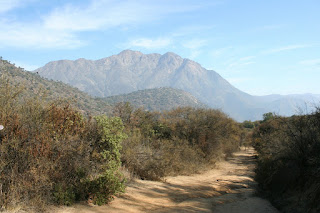 |
| Chilean wine palm |
These palms, which at one point were almost rendered extinct, have been reintroduced and flourish in the natural oasis of the national park.
 |
| Leg or (tree ) trunk |
Their distinctive trunk, grey and with the leathery look and shape of an elephant's leg, dot the hills and valleys of the park, which is overlooked by the eponymous La Campana (climbed by none other than Charles Darwin).
 |
| La Campana |
Humidity from the sea gets trapped here, allowing the palms, cacti and many other kinds of trees only seen in the south to flourish. The particular microclimate created here brings some of the verdant south to this arid area of Chile. There are no rivers and streams here - the only moisture being brought in from the sea - and yet there is a waterfall.
 |
| Microclimate |
With a small organised group from the school, led by the indomitable Jacqui, we took an 18km hike across the park, climbing briefly to enjoy the stunning view of the waterfall emerging from the cactus-strewn rocks. The views on our return leg were particular impressive, as an afternoon mist had veiled the distant hills.
 |
| Cactus country |
Tired, we drove towards home, stopping briefly to recharge our batteries with an enormous and fresh empanada de queso al horno.
No comments:
Post a Comment